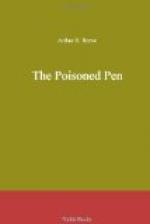It was quite late when we reached Riverwood, and Kennedy hurried along the dimly lighted streets, avoiding the main street lest some one might be watching or following us. He pushed on, following the directions Burke had given him. The house in question was a large, newly built affair of concrete, surrounded by trees and a hedge, directly overlooking the river. A bitter wind swept in from the west, but in the shadow of an evergreen tree and of the hedge Kennedy established our watch.
Of all fruitless errands this seemed to me to be the acme. The house was deserted; that was apparent, I thought, and I said so. Hardly had I said it when I heard the baying of a dog. It did not come from the house, however, and I concluded that it must have come from the next estate.
“It’s in the garage,” whispered Kennedy. “I can hardly think they would go away and leave a dog locked up in it. They would at least turn him loose.”
Hour after hour we waited. Midnight passed, and still nothing happened. At last when the moon had disappeared under the clouds, Kennedy pulled me along. We had seen not a sign of life in the house, yet he observed all the caution he would have if it had been well guarded. Quickly we advanced over the open space to the house, approaching in the shadow as much as possible, on the side farthest from the river.
Tiptoeing over the porch, Kennedy tried a window. It was fastened. Without hesitation he pulled out some instruments. One of them was a rubber suction-cup, which he fastened to the window-pane. Then with a very fine diamond-cutter he proceeded to cut out a large section. It soon fell and was prevented from smashing on the floor by the string and the suction-cup. Kennedy put his hand in and unlatched the window, and we stepped in.
All was silent. Apparently the house was deserted.
Cautiously Kennedy pressed the button of his pocket storage-battery lamp and flashed it slowly about the room. It was a sort of library, handsomely furnished. At last the beam of light rested on a huge desk at the opposite end. It seemed to interest Kennedy, and we tiptoed over to it. One after another he opened the drawers. One was locked, and he saved that until the last.
Quietly as he could, he jimmied it open, muffling the jimmy in a felt cloth that was on a table. Most people do not realise the disruptive force that there is in a simple jimmy. I didn’t until I saw the solid drawer with its heavy lock yield with just the trace of a noise. Kennedy waited an instant and listened. Nothing happened.
Inside the drawer was a most nondescript collection of useless articles. There were a number of pieces of fine sponge, some of them very thin and cut in a flat oval shape, smelling of lysol strongly; several bottles, a set of sharp little knives, some paraffin, bandages, antiseptic gauze, cotton—in fact, it looked like a first-aid kit. As soon as he saw it Kennedy seemed astonished but not at a loss to account for it.




